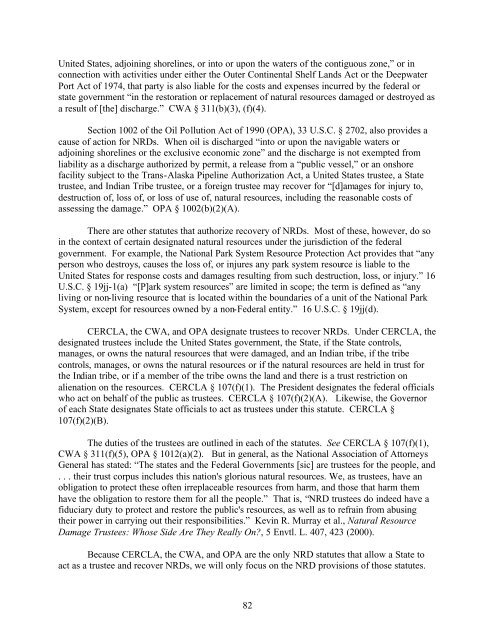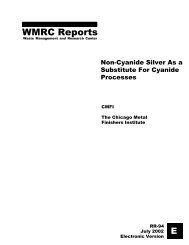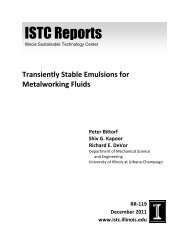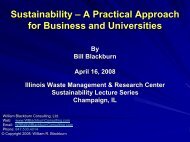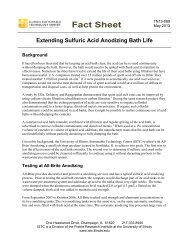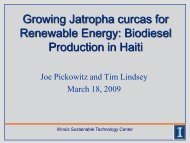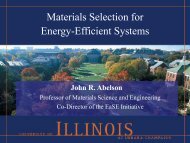Natural Resource Damage Assessment: Methods and Cases
Natural Resource Damage Assessment: Methods and Cases
Natural Resource Damage Assessment: Methods and Cases
Create successful ePaper yourself
Turn your PDF publications into a flip-book with our unique Google optimized e-Paper software.
United States, adjoining shorelines, or into or upon the waters of the contiguous zone,” or in<br />
connection with activities under either the Outer Continental Shelf L<strong>and</strong>s Act or the Deepwater<br />
Port Act of 1974, that party is also liable for the costs <strong>and</strong> expenses incurred by the federal or<br />
state government “in the restoration or replacement of natural resources damaged or destroyed as<br />
a result of [the] discharge.” CWA § 311(b)(3), (f)(4).<br />
Section 1002 of the Oil Pollution Act of 1990 (OPA), 33 U.S.C. § 2702, also provides a<br />
cause of action for NRDs. When oil is discharged “into or upon the navigable waters or<br />
adjoining shorelines or the exclusive economic zone” <strong>and</strong> the discharge is not exempted from<br />
liability as a discharge authorized by permit, a release from a “public vessel,” or an onshore<br />
facility subject to the Trans-Alaska Pipeline Authorization Act, a United States trustee, a State<br />
trustee, <strong>and</strong> Indian Tribe trustee, or a foreign trustee may recover for “[d]amages for injury to,<br />
destruction of, loss of, or loss of use of, natural resources, including the reasonable costs of<br />
assessing the damage.” OPA § 1002(b)(2)(A).<br />
There are other statutes that authorize recovery of NRDs. Most of these, however, do so<br />
in the context of certain designated natural resources under the jurisdiction of the federal<br />
government. For example, the National Park System <strong>Resource</strong> Protection Act provides that “any<br />
person who destroys, causes the loss of, or injures any park system resource is liable to the<br />
United States for response costs <strong>and</strong> damages resulting from such destruction, loss, or injury.” 16<br />
U.S.C. § 19jj-1(a) “[P]ark system resources” are limited in scope; the term is defined as “any<br />
living or non-living resource that is located within the boundaries of a unit of the National Park<br />
System, except for resources owned by a non-Federal entity.” 16 U.S.C. § 19jj(d).<br />
CERCLA, the CWA, <strong>and</strong> OPA designate trustees to recover NRDs. Under CERCLA, the<br />
designated trustees include the United States government, the State, if the State controls,<br />
manages, or owns the natural resources that were damaged, <strong>and</strong> an Indian tribe, if the tribe<br />
controls, manages, or owns the natural resources or if the natural resources are held in trust for<br />
the Indian tribe, or if a member of the tribe owns the l<strong>and</strong> <strong>and</strong> there is a trust restriction on<br />
alienation on the resources. CERCLA § 107(f)(1). The President designates the federal officials<br />
who act on behalf of the public as trustees. CERCLA § 107(f)(2)(A). Likewise, the Governor<br />
of each State designates State officials to act as trustees under this statute. CERCLA §<br />
107(f)(2)(B).<br />
The duties of the trustees are outlined in each of the statutes. See CERCLA § 107(f)(1),<br />
CWA § 311(f)(5), OPA § 1012(a)(2). But in general, as the National Association of Attorneys<br />
General has stated: “The states <strong>and</strong> the Federal Governments [sic] are trustees for the people, <strong>and</strong><br />
. . . their trust corpus includes this nation's glorious natural resources. We, as trustees, have an<br />
obligation to protect these often irreplaceable resources from harm, <strong>and</strong> those that harm them<br />
have the obligation to restore them for all the people.” That is, “NRD trustees do indeed have a<br />
fiduciary duty to protect <strong>and</strong> restore the public's resources, as well as to refrain from abusing<br />
their power in carrying out their responsibilities.” Kevin R. Murray et al., <strong>Natural</strong> <strong>Resource</strong><br />
<strong>Damage</strong> Trustees: Whose Side Are They Really On?, 5 Envtl. L. 407, 423 (2000).<br />
Because CERCLA, the CWA, <strong>and</strong> OPA are the only NRD statutes that allow a State to<br />
act as a trustee <strong>and</strong> recover NRDs, we will only focus on the NRD provisions of those statutes.<br />
82


